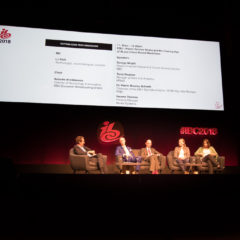Market research: how to conduct a qualitative interview?
At IntoTheMinds, we place particular importance on the development of qualitative interviews, whether face-to-face interviews or focus groups. They are part of the keys necessary for a complete market research study. Of course, they must be part of an overall methodology (you will find the details of this approach in our market research guide) and meticulously prepared through desk research. This qualitative phase is essential for the development of a quality quantitative questionnaire. Summary Introduction: The...
[PODCAST] Future Trends in Advertising with Paul Lee (Deloitte)
For this first episode of the year, we innovate a little and offer you a podcast in English. Our first interviewee of the year is a reference when it comes to the advertising market and the universe of media. Paul Lee is Deloitte’s Global Head of Research for the telecom, media and advertising markets. A triple skill that allows him to take an innovative and in-depth look at a market that has been in almost constant...
Is the younger generation digitally savvier than the old generation?
It is hard to resist the pleasure I experienced during the Keynote given by Esther Hargittai (Zurich Polytechnic School) on the second day of the RecSys 2019 conference (Copenhagen, Denmark). Her presentation on inequalities between individuals in the digital world was brilliant and humorous. So I had to prepare a post on a subject that is more important than ever: Our digital skills. On what do they depend? How are they measured? How can we influence...
How smartphones have changed our lives and enslaved us
You probably won’t read this article up to the end. And that’s because of smartphones. Smartphones have changed our lives. For the good but also for the worse. This article is not about the positive contribution of smartphones to our lives, it’s about its pervasive effects on our behavior and in particular on how it changes the way our brain works. “I want my life back” was the starting point of my quest for a better...
EMAC 2019: 5 research avenues for targeted advertising
At this year’s EMAC conference in Hamburg, I had been invited by Prof. Bernd Skiera and Prof. Klaus Miller (both affiliated with the University of Frankfort, Germany) to give a talk about online advertising research in the era of privacy. In today’s article I’m making my slides available and am developing my thoughts in the hope that they will help academics find new interesting paths for their future studies. Online advertising: a lot has been going...
EMAC conference 2019 : 5 marketing researches you need to know
The European Marketing Academy Conference (EMAC) is the number 1 marketing conference in Europe for academics. It’s a well attended (more than 1000 visitors) 3-day conference with up to 10 parallel tracks and hundreds of highly challenging presentations. This year I’ve chosen to present you the results of my 5 preferred research works. I tried to summarize the research as concisely as possible and highlighted the results in bold. In this selection you’ll find results that...
Market research: visualizing the shadow economy
In light of our recent post on credit card ownership, we used once again Tableau to explore data related this time to analyse and visualize the shadow economy. The shadow economy is the part of the economy that runs “off the records”. From a fiscal viewpoint the shadow economy can be defined as all the activities that evade taxation; in other words all activities for which taxes should be paid and aren’t. Assessing the level of...
Hospitality: why it’s important to answer online customer reviews
Social media is an unmissable way to connect customers and firms. It has also become a privileged channel to raise complaints and engage in positive and negative word-of-mouth. In today’s article we propose to analyse one aspect of electronic word-of-mouth (eWOM) which has been recently dealt with in a marketing research published in the Journal of Interactive Marketing by Jie Sheng (University of Bristol). This study investigated whether the firm–customer interaction is also a motivational driver...
Marketing research: the 4 dimensions of online customer experience
There is a lot of debate around the definition of customer experience. Despite intense marketing research there is for instance still no valid scale to measure it. Seeing a paper on online customer experiences published in the Journal of Marketing was therefore an exciting event for me. It’s entitled “Creating Effective Online Customer Experiences” and is authored by 3 scholars : Alexander Bleier, Colleen M. Harmeling, and Robert W. Palmatier. This piece of marketing research is extremely...
The effects of ad frequency and recency on click-through-rate (CTR)
Less is more. This could be the conclusion of a recent marketing research study on online advertising published in the IJRM (International Journal of Research in Marketing ; see references at the end of this article). The authors, Steffen Försch and Evert de Haan (University of Francfort, Germany) studied a dataset of 5.8bn ad impressions and 1.8m clicks delivered for 158 advertisers across 25 industries. Their work show that frequency and recency of online advertising do...
Marketing research : purchase drivers of luxury iconic products
An interesting piece of marketing research was presented on the last day of the International Marketing Trends conference that took place in Venice from 17 to 19 January 2019. The research was carried out by a team of 4 researchers from INSEEC business school (see reference at the end of this article) and was entitled “Timeless luxury: what drives the purchase of iconic products“. You’ll find the powerpoint slides of the presentation at the end of...
How do users behave when they can control the Spotify interface
At the RecSys 2018 conference an interesting piece of research was presented by Yucheng Jin (University of Leuven), Nava Tintarev (TU Delft), Katrien Verbert (KU Leuven). Their paper, entitled “Effects of Personal Characteristics on the Music Recommender with Different Controllability” explores the effects of an interface provided to Spotify users to better control and adjust their musical recommendations. Providing controlability on a spotify user interface Two levels of control are provided to the user. The first one...
Mixed research methods for the analysis of recommendation algorithms
The first day of the RecSys 2018 conference was dedicated to tutorials. One of them was assigned to mixed methods for evaluating user satisfaction. It was organised by a team of Spotify researchers (Jean Garcia-Gathright, Christine Hosey, Brian St. Thomas, Ben Carterette) and Fernando Diaz of Microsoft Research (Canada). The tutorials covered aspects of qualitative research, quantitative research and analysing data; a combination of techniques that very much resembles market research. Contact us for our B2B...
Overview of RecSys 2018 at EBU conference on artificial intelligence
A two-day conference was held at the headquarters of the European Broadcasting Union (EBU) in Geneva on 8 and 9 November. I had the pleasure of hosting a workshop on ethics and artificial intelligence aspects on the first day and giving an overview of the RecSys 2018 conference on the second day. In the latter, I presented what interested me most about RecSys 2018 (the most renowned conference on recommendation systems) which was held this year...
Recommendation systems: a scientific investigation of user inaction
One of the most interesting researches at RecSys 2018 was for me the paper on user inaction by Qian Zhao, Martijn Willemsen, Gediminas Adomavicius, F. Maxwell Harper and Joe Konstan (full title: “Interpreting User Inaction in Recommender Systems“). We are so focused on interpreting signals that we often forget to take the absence of signal into account. Yet, as this paper shows, lack of information is already a piece of information in itself and sometimes it can make a...
We need to rethink how to study filter bubbles: here’s why
At the RecSys conference, the last part of my keynote was dedicated to nuancing the myth of filter bubbles and to show the limitations of current academic research and propose a new research framework. Research on filter bubbles has been technology-driven As I explained in my talk, research on filter bubbles has been mainly technology-driven and deterministic. Escaping the “bubble” has been assessed on the basis of clics from one category of content to the other....
Why recommendation algorithms need to include personality and emotions
At the RecSys 2018 conference on recommender systems, a very interesting tutorial was given on the first day by Marko Tkalčič from the Free University of Bozen-Bolzano. In his presentation he focused on how emotions, mood and personality shape the way we consume recommendations. Emotions, Mood and Personality shape the way we behave Marko first reminded us that we, human beings, behave according to our emotions, mood and personality. Yet the latter vary according to different frequencies...
IBC 2018 in Amsterdam : the right place to detect trends in the broadcasting industry
I’ve been attending the IBC show for the last 3 years and, although it’s a long and quite exhausting experience (the show lasts for 6 days including conferences and welcomes 57000 visitors), it has proved to be very rewarding each and every time. This year I also had the honour to be invited to speak in a “cutting edge tech innovators” session entitled “Public Service Media and the coming age of AI and Cloud-based workflows” that...
Facebook alert: users are massively desinstalling the app in the US
A recent market research report published by the Pew Research Center, one of the worldwide leading market research institutes, sheds light on a phenomenon that may be the biggest threat that Facebook has had to face until now. A possible consequence of the Cambridge Analytica scandal, what the report reveals is that US users are massively deleting the Facebook application from their smartphone. Even worse, those who are must disinstalling the Facebook app are the younger...
Marketing research: the influence of privacy perception on customer loyalty
What does privacy mean in the age of robots, articifial intelligence and omnipresent algorithms? How do users percive privacy and how is it traded off against other benefits (personalization for instance)? Those are still emerging questions that a team of marketing researchers from the University of Toulouse (France) tried to answer at the 2018 EMAC conference that was helf in Glasgow. More specifically the study looked at the factors influencing the “sharing frequency” as a dependent...
Customer experience : finally a scientific scale to measure it
How to measure customer experience? This question has led many researchers on the path to developing scales to quantify something that is highly subjective by nature. Read also Yet most customer experience scales were until now limited to one particular domain or one particular moment of the customer experience (to get an overview of those moments please read our article on the subject). At the EMAC 2018 conference one research attempted to resolve this problem. A...
Market research : the combined effect of music and light in the retail sector
Sensory market research has focused mostly on the effects on consumer behavior of specific cues: light, scent, temperature, … Some of those cues are always present in a retail setting (light, temperature) and past studies have therefore investigated the effects of the variations of those cues (higher/lower temperature, more or less light) Company industry atmospherics charcateristics purpose abercrombie & fitch clothing loud music, dark light targets young customers victoria secrets clothing soothing music facilitate conversation between...
filter bubbles: scientific evidence that algorithms aren’t to be blamed
What can you discover about filter bubbles when you analyse datasets with billions of tweets over a 8-year period ? Some very interesting results for sure. In particular that you don’t need algorithms to stay within an echo chamber and that bridging echo chambers comes at a price. This contributes to the ongoing discussion on the very existence of algorithmic filter bubbles. Introduction Garimella et al. (2018) studied political exchanges on twitter Their research differs from...
30 days to read privacy policies: consent fatigue will make GDPR ineffective
It is said that the average American is subject to some 1500 privacy policies on a yearly basis which represent dozens of working days worth of reading. I did a little bit of research to find out where this come from and found out that the figure of 75 days worth of reading often cited in the press is erroneous. I did the math and found 30.5 days. Find out more in this article about “consent...
How to successfuly realize qualitative interviews in market research studies
Conducting good market research often requires to carry our a qualitative study. This is particulary true of customer satisfaction surveys that are often poorly designed and are not based on sound assumptions. In today’s article we reflect on some essential aspects of good qualitative research. We discuss a four-step iterative guide for interview design proposed by J. Arsel (2018) in his article entitled “Asking Questions with Reflexive Focus: A Tutorial on Designing and Conducting Interviews“. Step 1...
Face recognition algorithms are biases towards black people and women
Joy Buolamwini, a MIT PhD candidate, presented her research at the inaugural FAT Conference in New-York. She had previously given a TED talk and been invited to the White House to present her work on algorithmic fairness. In the paper she presented at the FAT conference Joy showed how face recognition algorithms can be biased towards certain segment of the population and in fact lead to discrimination. Here are the 2 main contributions of this...
The history of media resistance : from printing to social media through TV and radio
Throughout history people have shown remarkable resistance to new forms of media, be it books, cinema, radio, TV or Internet. Today social media addiction leads to a new form of resistance. A new book by Trine Syvertsen sums up remarkably the history of media resistance. The electronic version of the book is free and can be downloaded here. Here are some highlights from the book followed by thoughts on the evolution of media resistance. Contact us...
Market research combines Big Data and qualitative techniques .. 120 years ago
Visualizing data has become a standard task and one essential component of data science today. But, haven’t we forgotten how lucky we are to have all that data available and to be able to use it for various purposes ? An early example of Big Data and visualisation project One of the most stunning visualization projects I’ve come to know was initiated more than a century ago by Charles Booth, a Liverpool-born businessman who became...
If you are addicted to your social media, it’s because you suffer of FOMO
A recent research (Blackwell et al. 2017) has investigated the antecedents of social media addiction. In other words, what makes us look at Facebook, Linkedin, Twitter dozens of times every single day. Five variables were tested : age, extraversion, neuroticism, avoidance, anxiety, and Fear of Missing Out (FoMO). The results, published in the per-reviewed journal “Personality and Individual Differences” show that only fear of missing out is significantly correlated with social media addiction (you may be...
Marketing research reveals free apps are bad for business
A recent marketing research published in the Journal of Marketing reveals that offering a free version of an app reduces the speed of adoption of the paying version of the same app. In other words, you will reduce the odds of selling your mobile app if you propose a free version. This is especially true for hedonic apps (gaming, fun), the study reveals. This study was carried out on the basis of 12315 apps covering a...
Consumer behavior : why do we leave online reviews?
On the occasion of the RecSys 2017 conference I was fortunate to attend Prof. Lowenstein‘s inaugural talk that offered an inspiring overview of behavioral economics applied to recommendation systems. In particular Prof. Lowenstein explored the psychology of information sharing which is crucial in data science because it relies so heavily on users’ ratings (explicit feedback) to produce predictions. The talk by Lowenstein was fascinating. It started with the picture of a toaster as an illustration...
Market research : evolution of food purchasing behaviors on the French market
What are the significant trends in the food market? What is consumed, and how? In this article, we return to the evolutions of this market. Discover also the prospective study that we carried out on the future of the retail sector at the time of Covid-19 and our study on the market of organic products. As we detail in our white paper on market research, you will have to rely on many complementary aspects for a...
Airlines loyalty programs : different countries, different benefits
Loyalty cards have been an important innovation when it comes to increase customer loyalty. It ll started with American Airlines and the least we can say is that the airline industry is the one which has probably pushed the concept the farest. The concept of “miles” has become synonym of loyalty. Collecting miles was once limited to airlines tickets but has in the meantime extended to other purchases too. For instance, airlines members of Star Alliance...
Facebook doesn’t tell you really why you get targeted advertising
In the data world, the topics of transparency, privacy and ethics are more and more discussed. As we predicted a year ago, this may well be the next revolution in data science. We ran an experiment to understand the level of information Facebook users get on targeted advertising. Data literacy is essential Educating people on the role of data in their lives is essential. We see too many companies which revamp their terms and conditions and...
Ugly vegetables look more natural and give stores a better image
Consumers perceive “ugly”, misshappen vegetables, as more natural. Moreover communication campaigns promoting these “abnormal” products benefit also the stores , such campaign convey indeed a positive image in the minds of the customers. Those are the results of a study by Mia Birau and Corine Faure (University of Grenoble) which was presented at the latest EMAC 2017 conference in Groningen (The Netherlands). Market research on ugly products It all started with “ugly” vegetables, vegetables that were...
Recommendation algorithms : the myth of filter bubbles at stake
We’ve already discussed filter bubbles on this blog, a rather technical term that describes the negative effet of algorithms on our digital life. For more information read this thorough article. Whether or not filter bubbles really exist is still debated and I wanted to compile all scientific results on the subject. There are actually very few of them/ Although Pariser (2011) has claimed the obvious existence of filter bubbles, contradictory results have been obtained. Interestingly Anderson...




![[PODCAST] Future Trends in Advertising with Paul Lee (Deloitte)](https://www.intotheminds.com/blog/app/uploads/tik-tok-240x240.jpg)






































![Pay the true price for your coffee at Albert Heijn [Nudge Marketing]](https://www.intotheminds.com/blog/app/uploads/true-price-albert-heijn-4-60x60.webp)

![Web Analytics: definition, benefits, and strategy [Guide 2023]](https://www.intotheminds.com/blog/app/uploads/social-media-marketing-smm-banner-60x60.jpg)

![Sensory marketing: definition, advantages and use [Guide 2023]](https://www.intotheminds.com/blog/app/uploads/sensory-marketing-banner-60x60.jpg)




